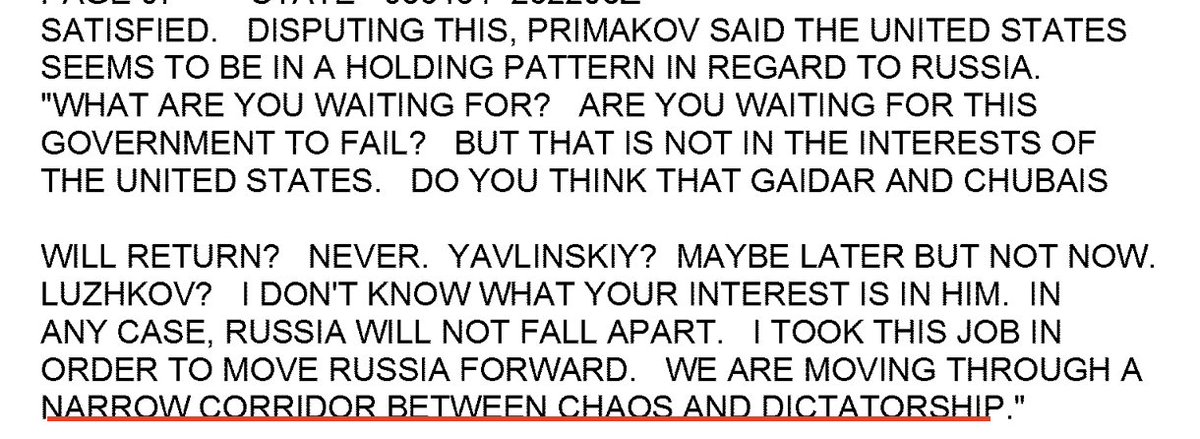
So I promised a thread on Belton's Putin's people, and why I think it's untenable as "history" (as fiction - yes, it's well-written). There are so many problems with the book that I don't even know where to begin, so instead of having a thousand examples, I will just mention two.
Both have to do with methodology. How do we - historians - establish that something is a fact? We find evidence. We weigh this evidence against other evidence to see how convincing it is. We provide references in order to convince fellow historians of the veracity of our takes.
Belton fails to do this. Her early chapters detail the collapse of the USSR, in which she claims that perestroika, begun under Andropov, was basically a "KGB" project (because, you see, KGB operatives served abroad and they knew that life was better there).
The way she "proves" it is by arguing that Soviet institutions (e.g. IMEMO & ISKAN) advocated reforms, and these were staffed by "KGB" people like Primakov etc. All of this suggests a masonic conspiracy, something that you see no hint of in the memoirs of key economic reformers.
I don't know how she could even write about the 1980s and not even consult the diaries of people like Anatolii Chernyaev who were close to power at the time, and who vividly depict, among other things, the Soviet economic meltdown and Gorbachev's desperation for cash.
This becomes important when Belton then spends a whole chapter on discussing the "party's money," billions of dollars, which were allegedly siphoned out of the USSR as it collapsed to continue financing KGB operations abroad. What's the evidence for this preposterous claim?
Well, she cites this website: kompromat.flb.ru/material1.phtm…, which includes an alleged document found by certain investigators in the home of Nikolai Kruchina after he committed suicide. The document is an alleged undertaking for "trusted custodians" to take over the "party funds". 

Belton dutifully translates the whole "document," although she must have noticed that the dodgy website provides no evidence of the original, nor any footnotes, not any sensible context. In other words, this is basically BS.
Her whole claim about a secret KGB conspiracy to spirit away party funds (in order to get back at the West after the Cold War) is based on this sort of nonsense. If Gorbachev was so rich, I'd ask, why did he spend his final years in power going hat-in-hand, pleading for funds?
OK, I'll cite Belton: "The night Nikolai Kruchina plunged to his death was the night the Communist Party's wealth was transferred to a new elite - and part of it had gone to the foreign intelligence operatives of the KGB." Cringe, cringe, cringe.
Once again, there are lots of examples - this is just one. Here's another one. At one point, she claims that Putin, while in Dresden, was involved in meetings with the Red Army Faction, which she then links to some terrorist acts. She clearly implies that Putin was responsible.
What's her evidence? It's one single *anonymous* interview with a member of the Red Army Faction. We don't know who it was, we have no way of determining veracity of these claims. We have no evidence that would confirm this, including from people who worked with Putin in Germany.
So, then, how can these kinds of claims be included in a serious work? I could go on and on and on. Most of the times I checked Belton's footnotes for scandalous claims, I'd find anonymous sources, or links to some dubious website, or untrustworthy sensationalist books.
That's what I mean by my earlier tweet: this is not how you write history. I understand that great conspiracies sell well but when you have to string these conspiracies from unreliable "evidence" of dubious provenance, you don't just fool your readers - you fool yourself.
• • •
Missing some Tweet in this thread? You can try to
force a refresh











